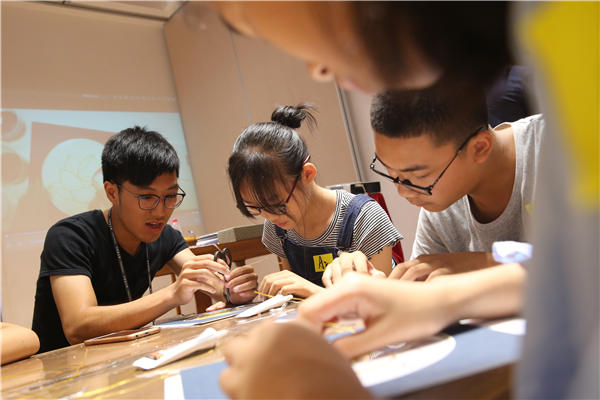Palatial groundings
By Wang Kaihao | China Daily | Updated: 2018-08-01 07:05

"I'll be either a teacher or promoter of culture in the future. I can use the experience I gain here to help pass on more knowledge about our local culture to the public."
Lasting benefits
According to Shan Jixiang, director of the Palace Museum, the institution has received about 100 interns from Hong Kong and Macao since 2005.
Last year, a large-scale internship program was launched to recruit 30 students from Hong Kong and Guangdong. This year, it expanded its scope to include Macao.
"The Cantonese-speaking region is the southern gate of our country," Shan says. "It has a different character and atmosphere from the north. These exchanges, spanning thousands of kilometers, make this connection even more meaningful."
Interns this year were assigned to 11 different departments of the museum. They have also been invited to attend lectures and visit other landmarks in Beijing, including the Great Wall and the ruins of the Old Summer Palace.
Shan says the program also benefits the museum, as its employees can learn about the social development of Hong Kong, Macao and Guangdong through the exchange.
"Cultural relics carry our country's spirit," he says. "It's our duty to gain wisdom from the relics we hold in our museums. This duty now also falls on the shoulders of the younger generations."
These internships can help the students find the path of their future careers.
"The public's understanding of cultural-heritage conservation is still lacking," says Kong, from the University of Melbourne.
"Sometimes, they wonder why it's so costly. I think I will choose this field as my career to help improve public awareness about conservation and history.
"What I see in the Palace Museum is something I've always wanted to do. I'd like to work here in the future, if possible."
While not every intern expects to work in a museum later, the summer program still represents a worthwhile endeavor.
"I applied to the ancient architecture department because I thought climbing out onto the roof would be fun," says 23-year-old Gao Yi, a recent graduate from the School of Automation Science and Engineering at the South China University of Technology in Guangzhou, Guangdong.
"Ancient architecture may not be directly linked to my academic studies, but these conservators have taught me an attitude," he says.
"They treat heritage as their own life. That devotion is also something I need to learn."
Li Cho-wing graduated as an accounting major from the University of Hong Kong this summer and plans to work for an auditing firm.
"Before I walk into office life, it's meaningful for me to sample this kind of experience," the 23-year-old says.
"No matter which major we are studying or what kind of job we plan to take, it's necessary to get to know our country better.
"The Forbidden City is a place where I can absorb national pride and feel a greater sense of belonging."
























